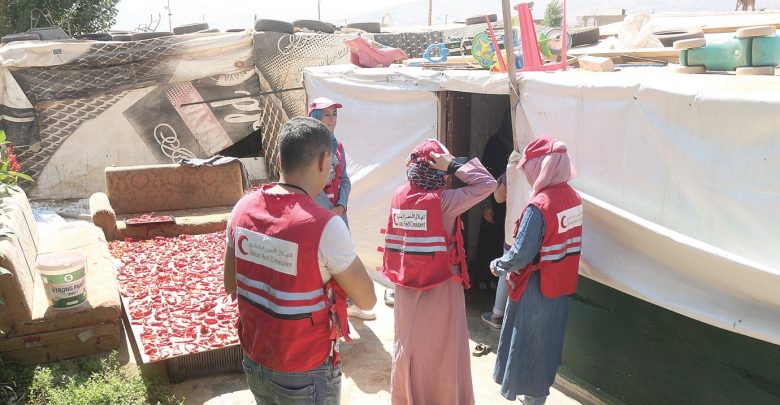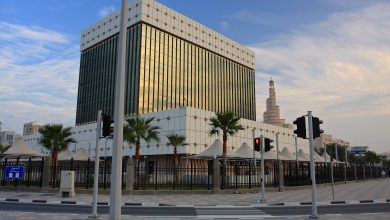
QRCS implements sanitation project for Syrian refugees
«الهلال القطري» يختتم مشروع المشاركة المجتمعية للاجئين السوريين
Doha: Qatar Red Crescent Society’s (QRCS) mission in Lebanon has completed a community-based project to enhance the sanitation services at four Syrian refugee camps in Joub Jannine, the capital of West Beqaa.
The project is supported by Elrha’s Humanitarian Innovation Fund (HIF) programme, a grant-making facility supporting organisations and individuals to identify, nurture, and share innovative and scalable solutions to the most pressing challenges facing effective humanitarian assistance. HIF is funded by aid from the UK Government’s Department for International Development (DFID).
Over the past six months, the toilets at the target camps were improved cleaned, maintained, and equipped based on the recommendations and needs of their end users.
“The value of the project goes far beyond the physical adjustments to the camp toilets, said Omar Katerji, head of QRCS’s mission. “The biggest success was not only the exterior and interior modifications to the structures, though important, but rather how such modifications were designed in a manner that reflects the needs of the beneficiaries.”
He highlighted the fact that being close to the beneficiaries requires reconsideration of the safety and security protocols, emergency plans, and the broader humanitarian action methodology.
“All our work should be beneficiary-oriented. Safety and security, logistics, procurements, human resources, and financial departments should work in harmony with the program management department in a dynamic rapid intervention system, with a well-controlled workflow timeframe and department-specific key performance indicators (KPIs),” Katerji noted.
Two advisors from Oxfam GB, a leading UK charity fighting global poverty, visited and evaluated the project. Over three days, they held interviews with Syrian men, women, and children; each camp’s security officer; and QRCS’s project team.
“Usually, humanitarian organizations have to intervene at short notice during emergency to provide life-saving aid and reduce disease risks, paying no attention the desires and needs of the refugees. The joint project of QRCS and HIF, however, serves as a role model in refugee community engagement in order to find out how to make their lives better,” said Helen Hawkings, one of the advisors.
Now, the toilets are bigger, cleaner, and lighted. A new ‘smart bucket’ has been developed to save water. Instead of having to go to the nearby greens, it has become safe for women and kids to use the toilets, even at night. Most importantly, the new sanitary facilities are special-needs-friendly.
“Formerly, going to the toilet was too difficult. No water. No lighting. In the winter, the sewage storage pits would overflow,” said Farah Al Hassan, a refugee who lived at a camp for three years now.
اختتم الهلال الأحمر القطري «مشروع المشاركة المجتمعية العاجلة في تصميم الصرف الصحي الموافق لمواصفات المستخدم»، الذي نفذته بعثته التمثيلية في لبنان داخل 4 مخيمات للاجئين السوريين ببلدة جب جنين التابعة للبقاع الغربي، وذلك بتمويل من «صندوق الابتكار الإنساني» (HIF) المدعوم من حكومة المملكة المتحدة، حيث قامت البعثة على مدار 6 أشهر الماضية بإجراء التعديلات اللازمة على دورات المياه الموجودة في المخيمات وتنظيفها وتجهيزها وصيانتها، وفق توصيات اللاجئين المستفيدين واحتياجاتهم.
وأكد عمر قاطرجي رئيس بعثة الهلال الأحمر القطري في لبنان: «إن قيمة هذا المشروع تتعدى بكثير التعديلات المادية التي تمت إضافتها إلى دورات المياه بالمخيمات، فأبرز نجاحات هذا المشروع لم تتمثل في تنفيذ التعديلات الخارجية والداخلية على هياكل دورات المياه (على أهميتها) فحسب، وإنما في طريقة استنباط هذه التعديلات بما يعبر عن تطلعات المستفيدين، ويلبي سبل عيشهم واحتياجاتهم».
وأضاف: «أظهر هذا النموذج فرصاً ضائعة بالجملة عند عدد من المنظمات الإنسانية التي تغيب عنها مسألة إشراك المستفيد في منظومة صنع القرار، وبالتالي تحرمه من إبداء الرأي في التصميم الأولي والتصاميم المعدلة التي تليه، الأمر الذي يمعن في إحباط المستفيد ويكلف المنظمات الإنسانية الكثير من الخسائر الناجمة عن عدم استخدام المستفيد لما تم اعتماده بالنيابة عنه».
وسبقت مرحلة الاختتام جولة لمستشاري منظمة «أوكسفام» البريطانية، نيكولاس فرمينات وهيلين هوكينغز، اللذين عملا على تقييم المشروع من خلال لقاءات متنوعة، على مدار 3 أيام، شملت اللاجئين السوريين من رجال ونساء وأطفال، بالإضافة إلى لقاءات مع شاويش كل مخيم، وفريق عمل الهلال الأحمر القطري المعني بتنفيذ المشروع.
وقالت هيلين هوكينغز: «المنظمات الإنسانية تضطر عادة إلى التدخل العاجل أثناء الطوارئ من أجل توفير المستلزمات الأساسية للحياة، وبالتالي الحد من مخاطر الإصابة بالأمراض، من دون الالتفات إلى رغبات اللاجئين واحتياجاتهم، في حين أن المشروع المشترك بين الهلال الأحمر القطري وصندوق الابتكار الإنساني قدم نموذجاً يحتذى به لإشراك مجتمع اللجوء في اقتراح الحلول وإبداء الآراء حول أفضل السبل الممكنة لتحسين ظروف العيش».
بدوره، صرح فرمينات قائلاً: «كان الهدف من لقاءاتنا التقييمية المتنوعة معرفة مدى نجاح المشروع والتحديات التي واجهها، وبالتالي الاطلاع على رأي المستفيدين وانطباعهم، ومدى استخدامهم لدورات المياه التي تم تحديثها»، مؤكداً أن المشروع كغيره من المشاريع واجه عدداً من التحديات، ولكنه أيضاً تضمن الكثير من التجارب الناجحة والدروس المستفادة الواجب تشاركها.;



